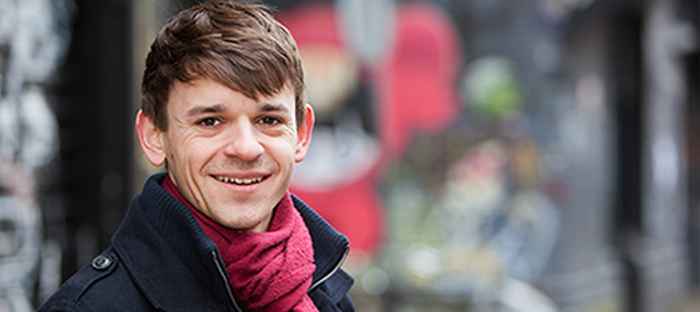Thomas Wolfs

Educational background
I have a Bachelor’s in Musicology from the University of Amsterdam. During my Bachelor’s degree I participated in a Bachelor's programme Clarinet at the Conservatorium van Amsterdam (CvA), which forms part of the Amsterdam School of the Arts.
Why Musicology?
I’ve always been interested in music, and after completing my Bachelor’s programme I wanted to further my studies and learn more about music cognition, which is a discipline that I have come to find totally engrossing. What I love about musicology is that it takes a theoretical and analytical approach to the exploration of music. Owing to my own musical background – I play the clarinet – I really wanted to combine music practice with music theory, and learn more about subjects such as harmonics, instrumentation and the history of music. The Master’s in Music Studies at the UvA seemed to be the perfect way to equip myself with a comprehensive understanding of another field (music cognition), thereby further undergirding my practical music skills with a theoretical foundation.
Has the programme met your expectations?
Absolutely. The programme is very intensive, but leaves much room for academic freedom. Participants are given the opportunity to examine various aspects of musicology and specialise in a subject area of their own choosing. For example, in courses focused on the history of music, students are allowed to choose a musical genre they find most interesting, such as pop, jazz and classical, which was my choice. In exploring these subjects, the programme hones participants’ research and writing skills and teaches them to think structurally, which is a vital career skill to have.
I enjoyed the course ‘music cognition’, which takes an in-depth look at recent developments in the research field of music cognition, such as the role of perception, attention, and memory in music listening, as well as the shaping role of these cognitive mechanisms in the origins of music. As part of the course we sometimes have to attend lectures at Science Park Amsterdam - an innovative, state of the art research centre with great facilities - which indicates just how much the programme is a cross-over between the humanities and the social and natural sciences.
The quality of the lecturers also deserves mentioning. Some, like Henkjan Honing, are renowned experts in the field of musicology and are constantly pushing the envelope in terms of teaching and research. The same goes for my fellow students, all of whom are very motivated and already have a thorough knowledge of the discipline.
Any other projects / extracurricular activities?
Music generally takes up a lot of my time. Aside from my studies, I also train on the clarinet for several hours a day and either play on my own or in a group. When I’m not busy with music, I play squash about once or twice a week and visit concerts and museums.
What do you think about the UvA / Amsterdam?
I have never regretted my decision to study at the University of Amsterdam. The University is beautiful and the quality of education is good. The university administration can, however, be a bit chaotic at times, but this is a common feature at all universities with large student populations.
As for Amsterdam, well, adjectives fall short. The city is beautiful, quaint and offers something for everyone. As a music lover I can attend dozens of concerts each month and visit all sorts of cultural festivals and museums. I can’t see myself living anywhere else at the moment.
Plans after graduating?
As I’ve mentioned, I really enjoy the combination of music theory and music practice; of making music and researching music. I would like to continue doing so in future and maybe do further research within the field of music cognition, which will be the focus of my Master’s thesis.
Tips for new students?
Have an open mind and take the time to experience all the idiosyncrasies of Amsterdam. Although it can be daunting to live and study in a new city, don’t draw back in your shell and isolate yourself from others; go out and meet new and interesting people.
As for the programme, think beforehand about the subject fields that interest you the most and then give it your all. The Master’s in Music Studies is constructed in such a way that participating students have the freedom to partially shape the programme in accordance with their own preferences. Use this freedom well and have the courage to participate in class. If you give it your all, the returns will be so much greater.